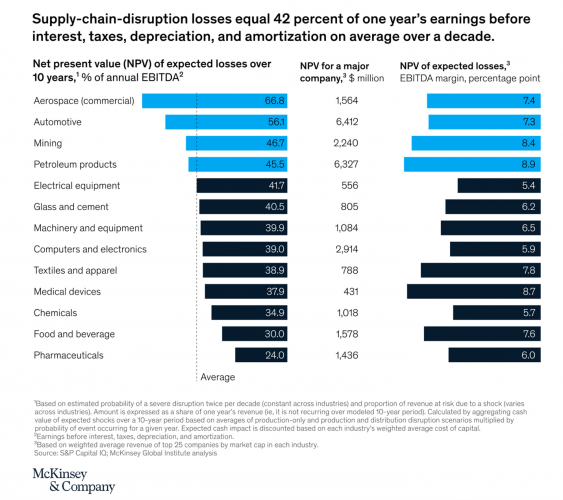Supply Chain Disruption Planning
Randy Wolken, President & CEO
Supply chains remain strained and a worry for so many industries and companies. Planning for significant disruptions and having a plan in place has never been more critical. A single cyber attack could cause extreme damage to your production and even lead to loss of customers and market share. A recent look at the impact on industries by McKinsey helps shed light on the topic.
The study looked at how different industries would be affected and estimated the net present value of expected losses over 10 years. Across all sectors, it equaled a loss of 42% of one year’s earnings. Different industries in the study experienced a higher impact, such as automotive and aerospace, while others were considerably lower, such as food and beverage and pharmaceuticals. However, for a company, the loss could still be in millions of dollars, or possibly billions for larger companies. Clearly, it is worth preparing to prevent or limit the impact of cyber threats.

Strengthening supply chain management and transparency. Several critical preparation steps identified by McKinsey’s study include:
- Targeting measures to mitigate disruptions.
- Increasing the ability to respond to anticipated shocks.
When these efforts are taken together, they could significantly reduce the length of disruptions, costs, and impacts on business and its customers.
It does not look likely that the current threats to supply chains will weaken. The cybersecurity threat alone has increased substantially since the war in Ukraine began. A lack of truckers, supply containers, and available cargo ships contribute to ongoing threats to nearly all industries. Many companies are attempting to localize their supply chains further to gain greater control. And Congress, with the support of the President, has moved to invest in local production and key industries. All of these efforts could help substantially.
Finally, please keep us informed of your efforts to combat supply chain difficulties and offer ways in which we might be able to help. For example, we offer supply chain management training to enable members to learn new approaches and techniques that can help mitigate impacts. Together we can better weather the supply chain challenges ahead.